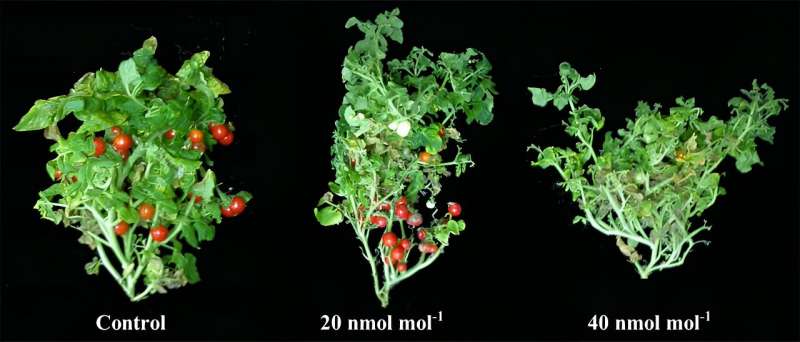This article has been reviewed according to Science X's editorial process and policies. Editors have highlighted the following attributes while ensuring the content's credibility:
fact-checked
peer-reviewed publication
trusted source
proofread
High heat, ethylene levels independently halt tomato fruit set

Ethylene is an essential plant hormone at low concentrations. Concentrations in the field rarely exceed 5 nmol⋅mol−1 (0.005 ppm), but it can accumulate as a gas in closed, indoor environments. These elevated levels can reduce growth and yield.
Ethylene regulates a wide range of developmental processes and serves an important role in abiotic and biotic stress responses. Low levels of ethylene increase leaf area in some species and interact with other plant hormones to regulate seed dormancy and germination. The most well-known effect of ethylene is on leaf and flower and senescence.
Flower and fruit development is particularly sensitive to ethylene. In most plants, there is a transient increase in ethylene production and an upregulation of genes encoding ethylene-binding proteins following anthesis.
Temperature alters ethylene synthesis and has the potential to influence ethylene sensitivity of crop plants in sealed greenhouses and indoor environments. Low-temperature stress increases ethylene synthesis in chilling-sensitive plants, and high-temperature stress caused kernel abortion in winter wheat. Kernel abortion did not occur in plants that were treated with the ethylene receptor inhibitor 1-methylcyclopropane (1-MCP).
We sought to determine the effect of ethylene on vegetative and reproductive growth of tomato (Solanum lycopersicum L.), and if sensitivity is altered by temperature. We hypothesized that ethylene sensitivity would be reduced at low temperature. Tomatoes were used in this research because their response to ethylene is well studied, ethylene-insensitive mutants have been developed, and they are sensitive to low levels of ethylene commonly found on the ISS.
We studied ethylene sensitivity of tomatoes (Solanum lycopersicum L. cv. MicroTina) using a unique, 12-chamber system. Ethylene levels of 0, 20, and 40 nmol⋅mol−1 (parts per billion) were maintained throughout the life cycle, at an air temperature of 22°C or 28°C. Yield of red fruit was three times higher at 22°C than at 28°C.
Our paper outlining the results, "Elevated Atmospheric Ethylene and High Temperature Independently Inhibit Fruit Set But Not Vegetative Growth in Tomato," is published in HortScience.
We found that there was a steady decrease in yield with increasing ethylene concentration, but vegetative growth was reduced less than 10% in any treatment. The highest ethylene concentration reduced yield to 11% of the control at 22°C and to 4% of the control at 28°C; the intermediate ethylene level reduced yield to 51% of the control at 22°C and 37% at 28°C. Regardless of temperature, filtering of ethylene in indoor environments to below 20 nmol⋅mol−1 is necessary to achieve normal fruit set and yield in tomato.
According to F. Mitchell Westmoreland, a coauthor on the paper, "Twenty years ago, we discovered that seed set of wheat was blocked by the ethylene levels on the International Space Station. Ethylene is not toxic to humans and the NASA air quality scientists were not monitoring it on ISS. This finding prompted a request for proposals for ethylene effects on food crops.
"With support from NASA, we designed and built an automated system to continuously monitor and control ethylene at ppb levels in 10 plant growth chambers. Plants synthesize ethylene throughout their life cycle, and it accumulates in closed environments. These findings inform air filtering requirements for closed-environment food production systems, in space and on Earth."
More information: Timothy J. Hudelson et al, Elevated Atmospheric Ethylene and High Temperature Independently Inhibit Fruit Set But Not Vegetative Growth in Tomato, HortScience (2023). DOI: 10.21273/HORTSCI16901-22
Journal information: HortScience
Provided by American Society for Horticultural Science




















